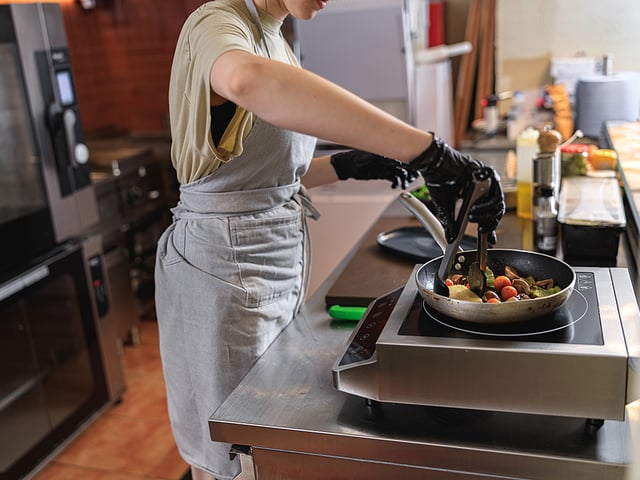
How to Become ServSafe Certified
The food service industry is bouncing back after COVID, providing an astonishing $1.06 trillion in market share. What does this mean for your career opportunities?
The current outlook on food preparation and serving jobs is 11% industry growth for the next 10 years, according to the Bureau of Labor Statistics. This rate is much faster than the standard occupational average.
Whether you want to establish your own eatery or start as a front-line worker, becoming ServSafe Certified can prove your service is a cut above the rest. It may even be required by your state.
If you’re looking for a comprehensive ServSafe certification guide, your search has ended. We have all the essential information you need right here in this handy article.
What is ServSafe?
ServSafe certification is managed by the National Restaurant Association. The certification process serves as a guide for maintaining health and safety in the food service industry.
There are five main ServSafe programs:
-
Food Handler
-
Food Manager
-
Alcohol
-
Allergens
-
Workplace
Some programs are mandatory to complete by state or county regulations. You can find out your local and state requirements for the alcohol, food handler, and manager programs through ServSafe’s regulatory map, or by checking with your state/county’s official website.
ServSafe Food Handler
The Food Handler certification ensures industry employees have a basic understanding of food safety. This includes:
-
Unsafe food causes
-
Preventing unsafe food
-
Proper personal hygiene
-
Time and temperature effects
-
Cross-contamination
-
Cleaning and sanitizing procedures
-
Garbage and pest management
Around half of U.S. states allow voluntary participation. The Food Handler program certification is currently required at the state level by 11 states:
-
Alaska
-
California
-
Florida
-
Hawaii
-
Illinois
-
Ohio
-
Oregon
-
South Carolina
-
Texas
-
Utah
-
Washington
This certification is for any employee that handles food. Managers will have a different certification, but they are still expected to know all of the info required by the food handlers.
ServSafe Food Manager
The food manager certification builds on the knowledge required for basic food handling. It includes:
-
Safe food provisions
-
Preventing foodborne illnesses
-
Food contamination
-
Foodborne illness response
-
Food allergens
-
Safe food handling
-
Health policies and staff monitoring
-
Flow of Food basics
-
Purchase, receipt, and storage of food
-
Food prep and service
-
Food safety management systems
-
Facility safety and pest management
-
Cleaning and sanitization
Currently, 42 states require either food manager certification or demonstration of its knowledge. Only 8 states require it by county:
-
Arizona
-
Maryland
-
Missouri
-
Nebraska
-
Nevada
-
North Dakota
-
Oklahoma
-
Wyoming
This certification is therefore a critical component of career advancement. Over 65% of manager certificate holders reported it helped them earn higher pay. Another 64% reported it helped them secure employment.
ServSafe Alcohol
The ServSafe Alcohol certification relates to the handling, service, and regulation of alcohol. There are three exam versions:
-
Primary exam (basic info)
-
Advanced exam (higher proficiency)
-
Cruise line exam (for cruise ship employees)
Like the Manager course, the Advanced exam builds on the basic knowledge included in the primary exam. Anyone who takes the Advanced course is also expected to know the Primary course info as well. This includes:
-
Alcohol laws and liabilities
-
Intoxication
-
IDs and serving alcohol
-
Difficult situations
Although this course may seem shorter, it’s fundamental to know every detail. Even a small regulatory lapse in alcohol service can cost you and/or your employer large amounts of time, stress, and legal fees.
ServSafe Allergens
The ServSafe Allergen certification helps employees prevent allergic reactions during food handling. It includes:
-
General food allergy info
-
Common food allergens
-
Cross-contact
-
Preventing allergic reactions
Food allergies can be serious and sometimes even fatal. The CDC’s research found that over 50% of food allergen fatalities were a result of food industry service.
ServSafe Workplace
The Workplace course is a different program from the previous four. Instead of focusing on the safe handling of food and drinks, this training goes over the issue of sexual harassment in the workplace.
There are two main courses available for purchase:
-
Understanding Unconscious Bias in Restaurants
-
Sexual Harassment Prevention for Restaurants
This program currently provides educational material only, without an exam. Only seven states require this program in some capacity:
-
California
-
Connecticut
-
Delaware
-
Illinois
-
Maine
-
New York
-
Washington
Additionally, Colorado, Massachusetts, Rhode Island, and Vermont encourage ServSafe Workplace certification. The District of Columbia requires it provisionally with funding.
How to Become ServSafe Certified
Getting your ServSafe Certification is relatively easy compared to other certification processes. You can complete the process in five easy and basic steps.
Step 1: Determine Which Certificates Your Require and/or Desire
Your first step is to list which certificates you’ll be pursuing. This can be based on:
-
County/state regulations
-
Workplace requirements
-
Employer mandates
-
Competitive hireability
-
Marketing strategies
-
Customer assurance
You may be required to have an Alcohol certificate, for example, and also want a Food Manager certification to boost your promotion chances. If you’re paying for the courses out-of-pocket, you may have to prioritize which ones to take first.
Step 2: Figure Out Which Training Options Work Best For You
ServSafe Certification programs are flexible. They know not everyone has the luxury of being a full-time student.
You have many options for language, training format, and exam format to help facilitate your learning. Available language options include:
-
English: training textbooks, online training courses, print and online exams
-
Spanish: training textbooks, online training courses, print and online exams
-
Chinese: training textbooks, print exams
-
Korean: training textbooks, print exams
-
Japanese: print exams
-
French Canadian: print exams
Additional languages may be available depending on the course and format.
You can also choose to have your training format and exam format in the classroom, or remotely through online access. Your exam and training formats do not have to match.
Step 3: Add Up the Costs
ServSafe courses cost much less than the average university course, but you may still need to plan out a budget. For example, the Manager certification costs are:
-
Online course and proctored exam: $179 USD
-
Online course: $125 USD
-
Exam with online proctoring bundle: $99 USD
-
Online course and exam bundle: $152.95 USD
-
Online exam proctoring: $63 USD
-
Online exam voucher: $36
Before you start raiding your bank account, however, you can research ways to save on costs. These can include:
-
Employer funding
-
State or county discounts and/or free programs
-
Scholarships
-
Grants
ServSafe offers its own scholarship and grant programs. They have a wide range of opportunities:
-
ProStart
-
Restaurant and Hospitality Leadership Center (RHLC)
-
Hospitality Opportunities for People Re-Entering Society (HOPES)
-
Pathways to Black Franchise Ownership
If you qualify under these programs, you may be entitled to free or reduced training along with many other perks. Check with each program’s eligibility requirements to learn more.
Step 4: Pass Your Class!
Once you’re all signed up and ready to go, it’s time to master the material. There are many free or low-cost resources to help you succeed:
-
Study guides
-
Lesson plans
-
Flashcards
-
Practice tests
-
Cram courses
-
Info blogs
Study guides help you organize the study material and your study sessions. You can easily review all the course material in one go. It also ensures you don’t study material that isn’t included.
Lessons help you boost study efficiency and test results. The program analyzes your performance and bases new lessons on areas that need more practice. The lessons are completed once you demonstrate mastery of key concepts and skill areas.
Flashcards help you retain information in your long-term memory. You can also add visual aids or other media enhancements. Flashcards are especially useful for material very specific details to memorize, like food and alcohol handling.
Practice tests help you boost your overall test performance. This study tool is also a great way to reduce test anxiety because you get a feel for the types of questions you’ll be asked. If you find yourself struggling with certain concepts, it’s a great way to help identify areas
Info blogs build on the real-world application of the concept and skills you learn. They can also offer tips from industry insiders. This helps you understand your study material as well as memorize it.
For the ultimate in study preparation, Union Test Prep’s Cram course for the ServSafe is a great way to study. If you’re pressed for time, not sure where to start, or just want the “easy button” for test prep, this resource lets you study on autopilot. Simply tell the cram course your test date and lesson plans and practice questions are created for the days/weeks you have left.
Step 5: Show Off Your Success
You’ll receive your certification once you’ve passed your course and the exam. You’re now ready to show your certification to any current and prospective employers so they can confirm your applicable skills and knowledge.
Benefits of Being ServSafe Certified
Your employer and/or state may require ServSafe certification. You should still pursue certification even when it’s not required, however.
ServSafe certificates come with many benefits. This can include:
-
Higher job performance
-
Fewer workplace mistakes and mishaps
-
Higher pay
-
More job opportunities
-
More career advancement opportunities
-
Increased customer trust
-
More positive work culture
-
Resume boosts
There are around 14.5 million employees in the restaurant industry alone. An extra ServSafe certification might be the one factor that accelerates your career chances over other qualified candidates.
Start Your Recipe for Career Success!
ServSafe certification proves you have what it takes to maintain high standards of safety and professionalism. You can easily become ServSafe certified with the right preparation and study.
You don’t have to pay premium prices to access premium products. Check out our free resources and guides today!
Keep Reading

ServSafe Food and Alcohol Safety Exams Blog
How Long Does ServSafe Certification Last?
The ServSafe certification is a critical credential for professionals i…

ServSafe Food and Alcohol Safety Exams Blog
The Big Eight Food Allergens are Now the Big Nine
An allergen is typically a harmless protein that, for some, the immune …

ServSafe Food and Alcohol Safety Exams Blog
ServSafe Food Handler vs. ServSafe Manager: Which Course is Right for You?
The food service industry requires stringent adherence to safety and hy…